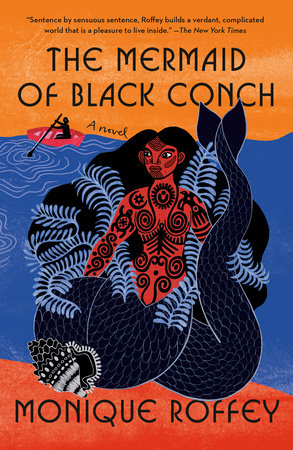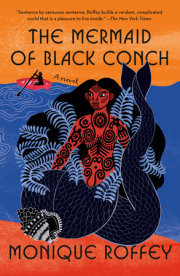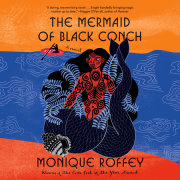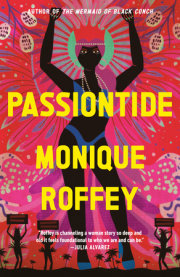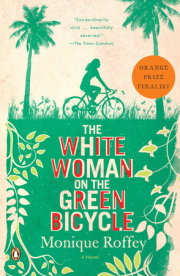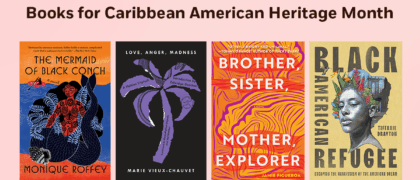WINNER OF THE COSTA BOOK OF THE YEAR AWARD
In 1976, David is fishing off the island of Black Conch when he comes upon a creature he doesn’t expect: a mermaid by the name of Aycayia. Once a beautiful young woman, she was cursed by jealous wives to live in this form for the rest of her days. But after the mermaid is caught by American tourists, David rescues and hides her away in his home, finding that, once out of the water, she begins to transform back into a woman.
Now David must work to win Aycayia’s trust while she relearns what it is to be human, navigating not only her new body but also her relationship with others on the island—a difficult task after centuries of loneliness. As David and Aycayia grow to love each other, they juggle both the joys and the dangers of life on shore. But a lingering question remains: Will the former mermaid be able to escape her curse? Taking on many points of view, this mythical adventure tells the story of one woman’s return to land, her healing and her survival.
“One can’t help admiring the boldness of Roffey’s vision. . . . Sentence by sensuous sentence, Roffey builds a verdant, complicated world that is a pleasure to live inside. . . . Aycayia is a magical creature, though rendered so physically you might start to believe in the existence of mermaids.” —Shruti Swamy, The New York Times
“Vivid imagery, discussion-worthy themes, Creole verbiage and a melding of history and magic make The Mermaid of Black Conch come to life. It’s a confluence of lore in which subtle details change depending on who is telling the story. Each has their own idea of what it is to be a man, a woman, the oppressor, the oppressed, or something in between worlds. . . . It seems Roffey has hit her stride.” —Donna Edwards, Associated Press
“A vivid phantasmagorical fairy tale. . . . With a lilting patois and rollicking prose, Roffey evokes the Antillean settings, characters, and culture. This makes for an entrancing siren song.” —Publishers Weekly
“Achingly evocative, the Black Conch mermaid’s story and the people she meets after her return from the sea powerfully capture the nature of longing and belonging.” —Bridget Thoreson, Booklist
“[Roffey is] changing the face of Caribbean literature. . . . [The Mermaid of Black Conch] joins an impressive wave of recent books by Trinidadian women writers . . . which are helping redefine a literature once dominated by noisy men.” —Anderson Tepper, Los Angeles Times
“Full of lean, elegant, evocative prose that never overstays its welcome or drifts too far from its narrative, this finely honed novel about belonging, alienation and the enduring power of stories moves with the breathtaking rush of an ocean wave. . . . Like her title character, Roffey’s prose is a shape-shifting, living thing, moving through emotional highs and lows with an almost mercurial grace. Roffey achieves this flow state with astonishing economy, which enables her to linger on existential questions. . . . A gripping dark fairy tale that any fan of contemporary fantasy will happily swim through.” —Matthew Jackson, BookPage
“Poetic, meticulous prose. . . . While this may seem like a tale often told, it is set apart by the rich materiality of the writing and of its Caribbean setting. . . . Roffey’s descriptions of Aycayia are strikingly different from the girlish, suspiciously well-groomed mermaids of popular culture and animated films. . . . Roffey takes the mermaid, makes her fleshy, textured, and real, and places her in the milieu of a rich cultural world. She gives us a love story between a fisherman and a mermaid that feels both fresh and timeless. In capturing every detail of the mermaid’s slow, messy transformation back to woman, Roffey speaks to longings that, as a reader, I did not know I had.” —Jalondra A. Davis, Los Angeles Review of Books
“A story that’s evocative and reminiscent of oral storytelling traditions. . . . Written partly in a beautiful rhythmic, lilting patois that creates a bold vision, it’s easy to find yourself deeply immersed in Roffey’s world, in a narrative that shows us how magic realism is oftentimes the best, most appropriate genre for post colonial fiction.” —Mahvesh Murad, Tor.com
“A searing blend of Caribbean magical realism and contemporary examination of misogyny and the reverberations of colonial oppression. . . . Roffey’s fable is a moving love story, full of messy, glorious eroticism, but she also shines a light on the dangers of toxic masculinity, racial inequity and the difficulty of understanding our true natures.” —Connie Ogle, Star Tribune
“A mesmerizing, fantastical tale that explores all-too-real Otherness. . . . The strange magic in The Mermaid of Black Conch is the best kind—wondrous, amazing to all who encounter it, but utterly real. . . . Roffey’s writing is a delight to swim in. It’s lyrical and lovely, and it flows clear and deep as the waters around Black Conch. Her landscape descriptions are rich, whether she is painting pictures of the lush forest shading Miss Rain’s house or of the ocean.” —Sally Shivnan, Washington Independent Review of Books
“Every sentence in Monique Roffey's extraordinary book is alive with fluming, amphibious intelligence and alert to the blessing, and the curse, of love in a life of flux. A new sea hymnal to challenge, and change, the old dark songs that humans know by heart.” —Karen Russell, author of Swamplandia! and Orange World and Other Stories
“I absolutely devoured The Mermaid of Black Conch. It’s wonderful, immersive, evocative. . . . A masterclass of world-building.” —Bridget Collins, author of The Binding
“Stunning. . . . A mesmerising read.” —Nathan Filer, author of The Shock of the Fall
“The novel is a unique Caribbean fable that takes the familiar story of a mermaid abruptly thrust onshore and brings it to a new place. It reads like the work of a novelist in command of her material and focused on using a mythic ‘then’ to speak to now.” —Malachi McIntosh, fiction chair, OCM Bocas Prize 2021
“Once I had started it. . . . I couldn’t stop. It was quite unlike anything I’d ever read. Such brilliant mythmaking; such powerful storytelling. The account of the mermaid’s capture was agonising to read—a feminist reframing of all those Great American Novels about men and the sea. Monique Roffey managed to say so much about society’s treatment of difference, enslavement, exploitation of the natural world, sexual politics, but without ever sermonising or compromising the storytelling.” —Clare Chambers, author of Small Pleasures
“[The Mermaid of Black Conch] is a daring, mesmerising novel that continually unseats expectation—I was deliciously unsure, throughout, what would happen next. With her fierce and shape-shifting mermaid, Roffey has created a modern myth about belonging and the bonds humans form with each other and with their land, single-handedly bringing magic realism up-to-date.” —Maggie O’Farrell, The Observer, “Summer Reads to Get Lost In”
“An extraordinary, beautifully written, captivating, visceral book—full of mythic energy and unforgettable characters, including some tremendously transgressive women. . . . It is utterly original—unlike anything we've ever read—and feels like a classic in the making from a writer at the height of her powers. It’s a book that will take you to the furthest reaches of your imagination—we found it completely compelling.” —Suzannah Lipscomb, chair of Costa Book Awards Judges, 2020
“A joy to read, brimming with memorable characters and vivid descriptions. . . . For me, this was a hugely entertaining and thought-provoking novel.” —Rebecca Jones, BBC News
“Not your standard mermaid. No comb and glass, no Lorelei hair. No catch and release.” —Margaret Atwood, author of The Testaments, via Twitter
“[Monique Roffey] is the most adventurous of writers and The Mermaid of Black Conch does not disappoint. . . . This is a strange, haunting, original and memorable novel about Aycayia, a mermaid from deep history who is entrapped and taken out of the sea. . . . This is a novel packed with layers of meaning around womanhood, alienation, masculinity, toxic attitudes towards women, and inter-female rivalry, as well as love, compassion and the search for home.” —Bernardine Evaristo, author of Girl, Woman, Other
“At last we have Monique Roffey to unhook woman from legend and bring tired myth into the realm of flesh and blood and sex. The Mermaid of Black Conch plunges fearlessly into the deeps of misogyny, colonial violence, friendship, jealousy, and erotic love in a reading experience as captivating as a tropical storm. Full-throated and mesmerizing.” —C Pam Zhang, author of How Much of These Hills Is Gold
“Wonderfully written, with both soul and intense drama—it glistens almost, like the mermaid!” —Diana Evans, author of Ordinary People
“The Mermaid of Black Conch arrives bearing tragedy and beauty. Monique Roffey has created a new myth for an age of ruined oceans. She continues to be one of our most exciting new Caribbean voices.” —A.L. Kennedy, author of The Little Snake
“Monique Roffey is a writer of verve, vibrancy and compassion, and her work is always a joy to read.” —Sarah Hall, author of Burntcoat
“The Mermaid of Black Conch is like a lost myth, found, and made fresh again for our times.” —Tessa McWatt, author of Shame on Me: An Anatomy of Race and Belonging
“[The Mermaid of Black Conch] is a strange and beautiful book. . . . Roffey’s writing is lyrical and filled with magic, but there is plenty of bittersweet realism to ground it.” —Sophie Dahl, Daily Mail (UK)

